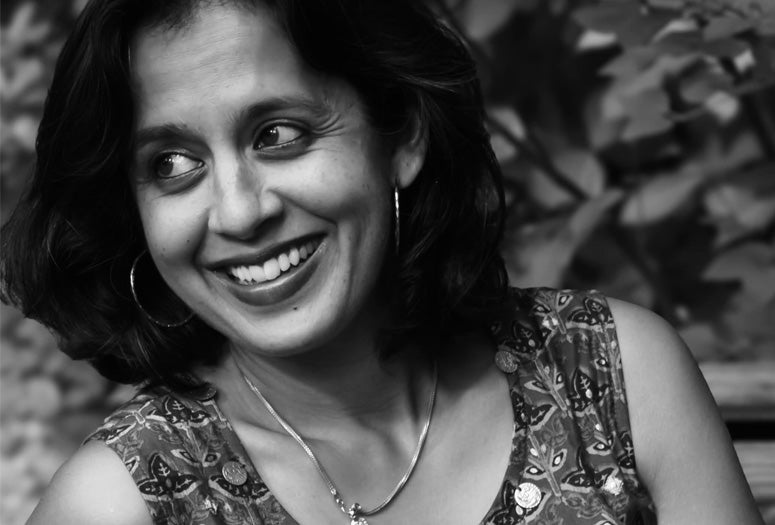Ragini Tharoor Srinivasan, an assistant professor of English at Rice University, has spent much of her career exploring the boundaries of disciplines. With degrees in literature and rhetoric, her academic trajectory has been shaped by interdisciplinary inquiry. Her work on “Thinking With an Accent: Toward a New Object, Method and Practice,” a co-edited volume that has helped push the field of accent studies into a new era, crystallized her commitment to scholarship that moves beyond disciplinary confines.

“Interdisciplinarity is not just something that happens between disciplines but actually many different knowledge projects with their own originary force,” Srinivasan said.
The edited volume brought together scholars from literature, film, sound studies, anthropology and other fields to interrogate the role of accent as a social, cultural and political construct that resides as much in the ear of the listener as the voice of the speaker. Srinivasan and her co-editors sought to establish a conceptual framework for thinking about accent across a wide range of fields, challenging traditional disciplinary boundaries in the process.
“We were all humanists working in related fields, studying subjects like voice and identity through different media and genres,” Srinivasan said. “What we found in accent was a concept that spoke to all of our interests and questions, while serving as a bridge to the social sciences and inviting new collaboration across fields.”
Srinivasan says the project reinforced her belief that interdisciplinarity is not only a matter of combining insights from different disciplines but can also constitute a distinct knowledge project with its own theoretical foundations and methodological approaches.
“Fields like women’s studies, ethnic studies and American studies have always been inter- and multidisciplinary,” Srinivasan said, noting that she views these fields as inherently interdisciplinary rather than as spaces that merely borrow from or combine the insights of multiple disciplines.
This perspective informs Srinivasan’s teaching, especially The Humanities Beyond the Disciplines, a graduate seminar she is currently co-teaching with Laura Correa Ochoa, assistant professor of history. The course, which is required for first-year humanities doctoral students, begins by asking students to examine their disciplinary foundations and locations — what it means to be a historian, philosopher or literary critic — before inviting them to think beyond disciplinary divisions.
“We all come to the table from these specific disciplinary vantages,” Srinivasan said. “First, we must take stock of where we are before we can think beyond disciplinary division.”
Students consider the assumptions, methodologies and evidentiary protocols that shape their fields before engaging in cross-disciplinary dialogue. The course encourages them to identify the limits of their disciplinary training as well as the possibilities that emerge from thinking collaboratively about the shared stakes of humanistic inquiry.
As interdisciplinary scholarship becomes more prevalent, questions arise about how it fits into institutional structures at different stages of academic training.
“There have been persuasive arguments — Eric Hayot’s recent writing on this comes to mind — that maybe undergraduates shouldn’t even have majors in specific fields like English and history but that really what they should have are interdisciplinary humanities degrees that speak honestly and rigorously to the kinds of topic they are interested in like migration, social justice, even truth and beauty, while drawing from different departments,” Srinivasan said.
At the graduate level, the situation is more complex. Doctoral education, despite embracing interdisciplinarity in theory, remains largely structured around the pressures of professionalization. The already constrained academic job market remains organized along disciplinary lines requiring doctoral candidates to demonstrate expertise in a clearly defined field.

“We have to teach our students how to perform their disciplinary legibility while making a case for their interdisciplinary scholarship and teaching,” Srinivasan said.
Faculty also navigate these tensions. While interdisciplinary inquiry fosters collaboration and broadens scholarly reach, institutional structures often privilege disciplinary authority, particularly in tenure and promotion processes. Srinivasan, whose training in literature and rhetoric preceded her appointment as an English professor, understands this firsthand.
“I feel like I earned another Ph.D. in English in my years as an assistant professor, and I did it basically on the job,” Srinivasan said.
Despite these challenges, she remains committed to interdisciplinary scholarship as a means of generating new ways of thinking. She said she believes that engaging with other disciplines expands intellectual horizons and encourages a more generous, collaborative approach to knowledge production.
“The sciences and social sciences have been historically more collaborative and open to co-writing — consider the structure of the lab — and when you start to work across fields, you almost by definition have to be in collaboration with others,” Srinivasan said.
Her next major project “In(ter)disciplined: Scholarly Formation in Theory and Practice” continues this line of inquiry. The book, which is in development, examines how scholars navigate interdisciplinary training and the challenges of disciplinary legibility.
“This project began with a desire to investigate my own scholarly formation and to think about both the possibilities and pitfalls of interdisciplinarity,” Srinivasan said.
While she develops “In(ter)disciplined,” she also has three other books scheduled for publication this year. Srinivasan co-wrote “The End Doesn’t Happen All at Once: A Pandemic Memoir” with a friend who did their doctoral work on Plato. She is also the author of “Overdetermined: How Indian English Literature Becomes Ethnic, Postcolonial and Anglophone,” a cultural study of literary studies, and “What is ‘We’?,” a collection of essays written for a series in public philosophy.
As she works to further develop the field of accent studies and advance interdisciplinary approaches to the humanities, Srinivasan remains committed to fostering conversations that push the boundaries of traditional academic structures.
“We’re developing a book series tentatively called ‘Accented’ in which we hope to publish creative and critical projects from traditional monographs to digital video essay books to dialogical experiments in collective criticism. We hope it demonstrates the critical potential of accent specifically and interdisciplinary thinking more broadly in the humanities,” Srinivasan said.

